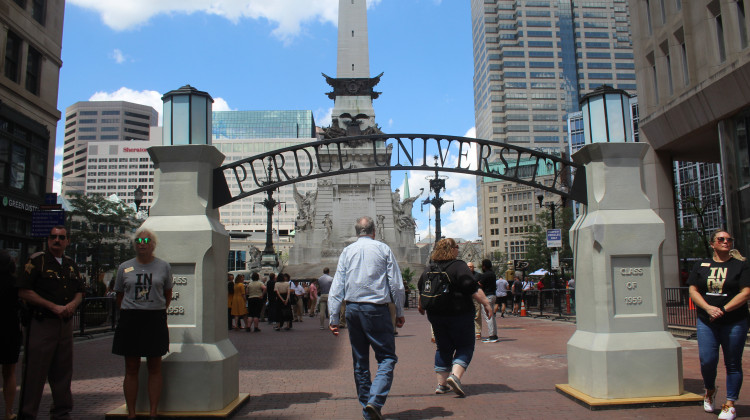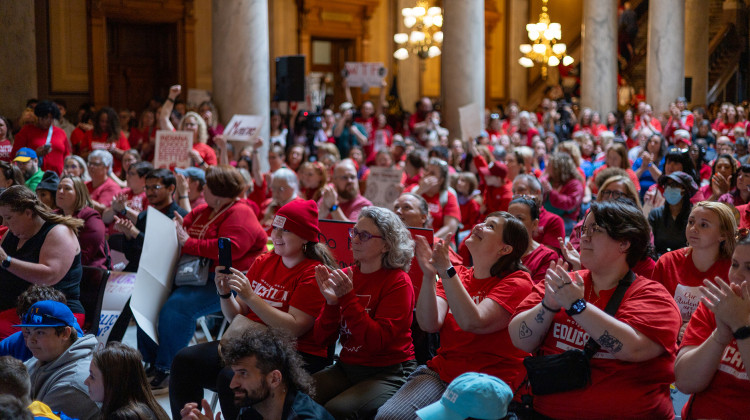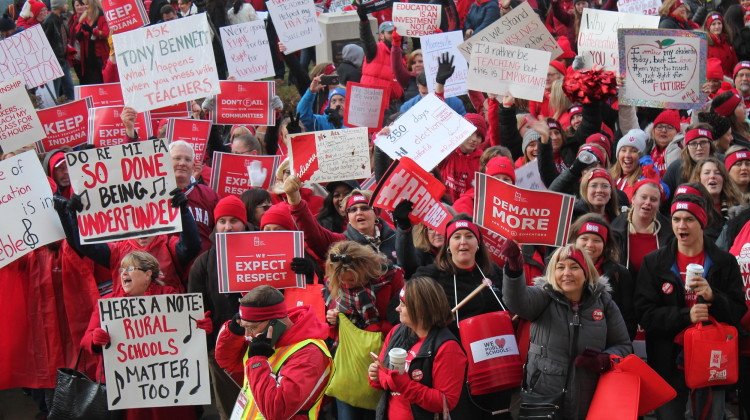
Students from Roncalli High School wave rainbow flags during a football game in August 2018 in support of guidance counselor Shelly Fitzgerald. The 7th Circuit Court of Appeals on Thursday, July 13, 2023, upheld the ruling for the Catholic school and the Archdiocese of Indianapolis that Fitzgerald could be fired for her same-sex marriage under the ministerial exception.
Lauren Chapman / IPBFor the second time, a federal appeals court ruled that the Archdiocese of Indianapolis and one of its schools did not violate discrimination laws when it fired a school counselor in 2018 for being in a same-sex marriage.
The court upheld that the private, Roncalli High School was free to terminate the long-time counselor Shelly Fitzgerald under the ministerial exception because she was expected to follow and promote the teachings of the Catholic faith. The Catholic Church does not support gay marriage.
It was the second time in a year that the archdiocese and Roncalli won a legal case after it faced lawsuits for firing two gay women who co-ran the guidance department at the school.
Fitzgerald worked at Roncalli for 14 years before the archdiocese found out she was married to a woman. The church did not renew her employment contract because of the marriage.
Fitzgerald later filed sex discrimination claims against the archdiocese and the school. At the time, Fitzgerald’s attorney said Roncalli was selectively enforcing a morality clause in its contract.
But the Chicago-based 7th Circuit Court of Appeals blocked Fitzsgerald’s lawsuit by affirming a district court’s year-old decision in a 15-page opinion. The court cited past U.S. Supreme Court decisions on the principle of ministerial exception — which allows religious institutions to determine employment rules with employees whose job involves religious duties.
The court also referenced its previous ruling in a similar case involving Fitzgerald’s co-director of guidance at Roncalli, Lynn Starkey, who was fired for her same-sex marriage.
“That decision goes a long way in resolving this case,” Judge Amy St. Eve wrote in the unanimous opinion.
Dispute over job duties
Throughout the legal fight, the two sides disputed whether Fitzgerald’s job had a ministerial role. Fitzgerald maintained she never engaged in religious teaching, and Roncalli expected her to focus on the “nuts-and-bolts” of daily school operations and helping students with career guidance, testing for college admittance exams, and class scheduling.
The school principal testified that Fitzgerald “received more positive comments” than any other employee whenever he sought feedback. No comments mentioned Fitzgerald doing religious or ministry work, or the need for her to incorporate that into her job, according to the opinion.
In May 2018, Fitzgerald signed an employment contract that included a ministry description and required her “to communicate the Catholic faith to students, pray with students, and teach and celebrate Catholic traditions,” according to the opinion.
The contract effectively made her “a minister of the faith,” the court said and required her to follow “moral or religious teachings of the Roman Catholic Church” in her personal life as a stipulation to remain employed at the school.
Fitzgerald was placed on administrative leave by school officials after they found out she was married to a woman and before she was terminated.
The court upheld the lower court’s decision that Roncalli can decide to employ those who support the school’s religious mission and follow church teachings in their personal life.
Becket, the legal group representing the Archdiocese of Indianapolis and the high school, said the appeals court decision protects Catholic schools’ ability to choose leaders who will convey the faith to students.
“Religious schools exist to pass on the faith to the next generation, and to do that, they need the freedom to choose leaders who are fully committed to their religious mission,” Joseph Davis, counsel at Becket, said in a statement. “The precedent keeps piling up: Catholic schools can ask Catholic school teachers and administrators to be fully supportive of Catholic teaching.”
Rachel Laser, president of Americans United for Separation of Church and State, and a member of Fitzgerald’s legal team, described the case as an attack by “religious extremists” who are "waging a crusade to undermine basic civil rights…”
“Shelly Fitzgerald’s case was another line of attack. These religious extremists are trying to expand a narrow, commonsense rule — meant to allow houses of worship to select their own clergy according to their own faith — into a broad license to circumvent civil rights laws and to discriminate,” Laser said in a statement.
Fitzgerald has 90 days to appeal to the U.S. Supreme Court.
State Democratic lawmakers have sought to block private religious schools like Roncalli from the taxpayer-funded private school voucher program if they discriminate against employees. But proposed legislation has been effectively ignored by the Republican supermajority.
Roncalli High School receives the most state funds among all private schools in the voucher program at $4.15 million for 655 students, according to a recent state report.
Vouchers either provide 90 percent of the amount of state funding a public school corporation receives for each student or cover tuition and fees – whichever is the lesser amount.
Contact WFYI education editor Eric Weddle at eweddle@wfyi.org or call (317) 614-0470. Follow on Twitter: @ericweddle.
 DONATE
DONATE






 Support WFYI. We can't do it without you.
Support WFYI. We can't do it without you.